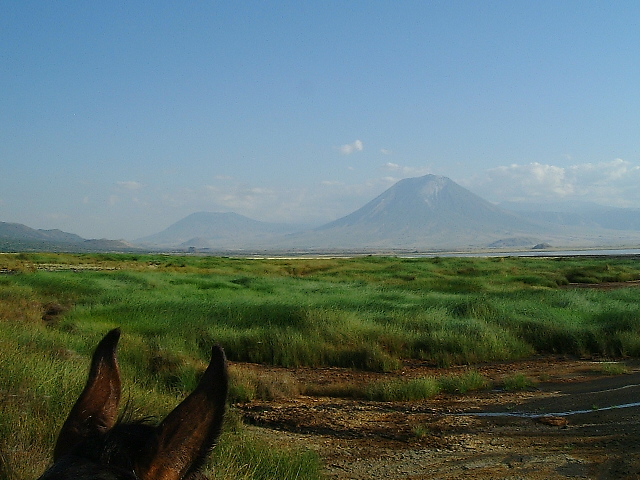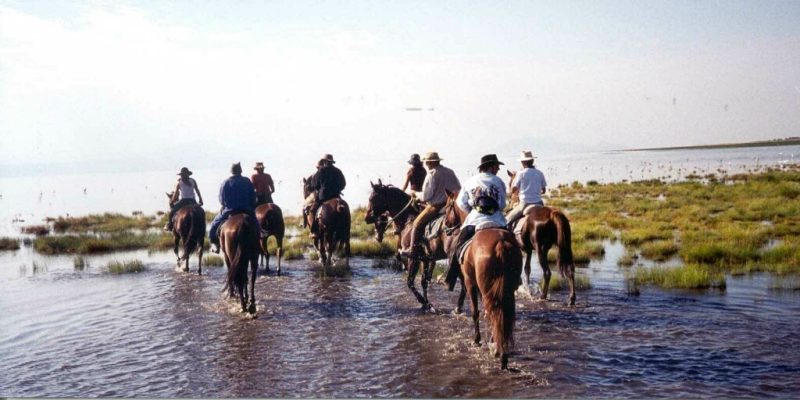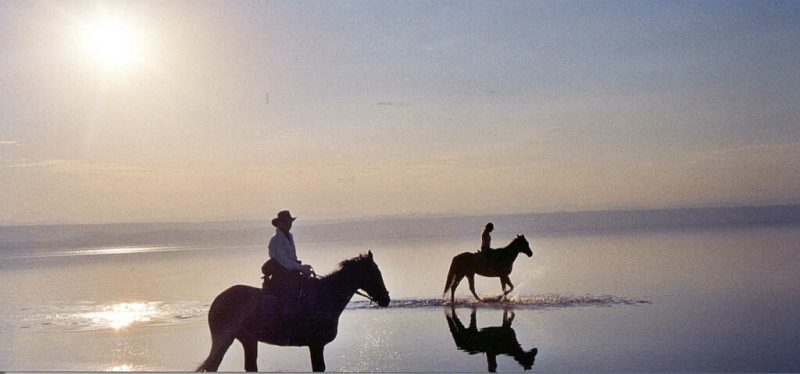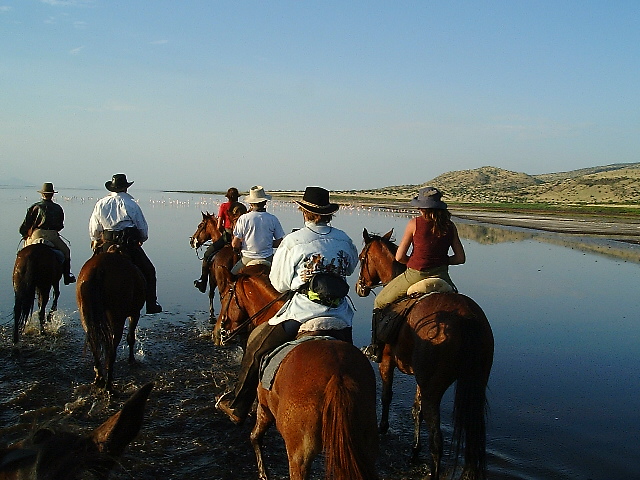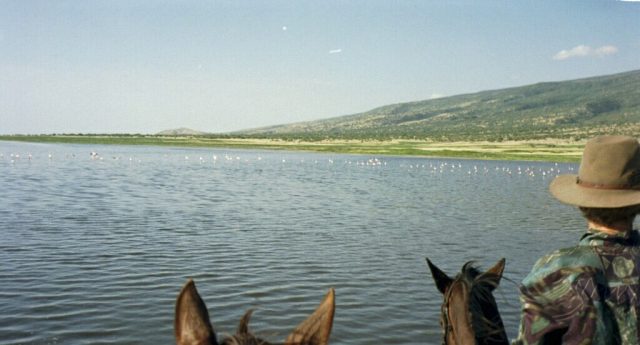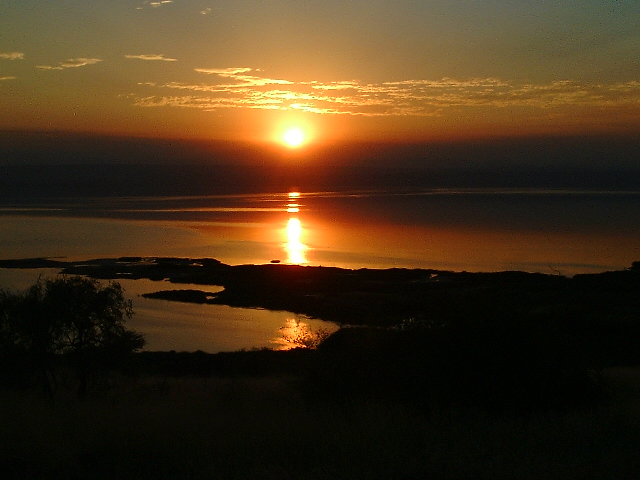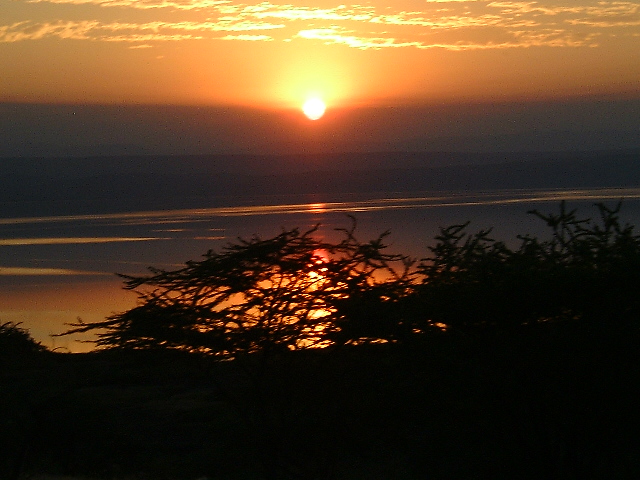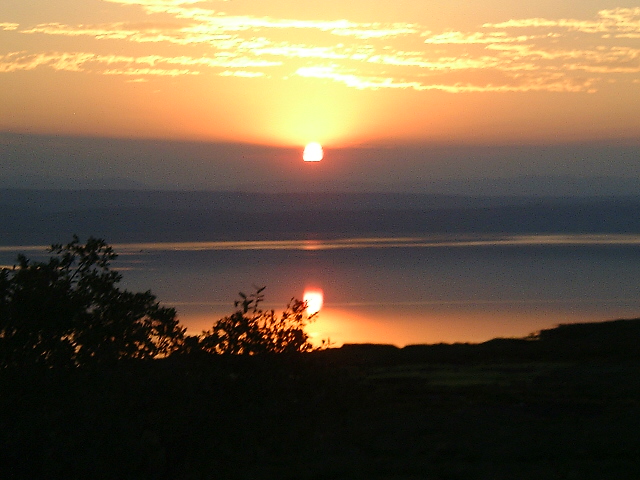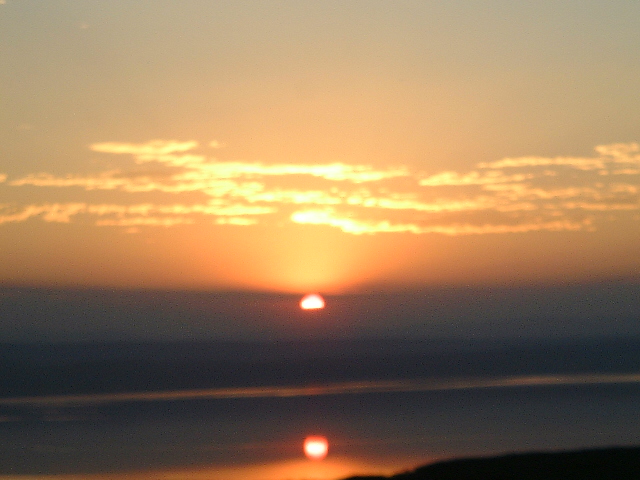After our leisurely lunch with our unexpected
"fly by" visitor and our usual siesta, we mounted back up for the ride
to Camp 6. It was a wonderfully encouraging sight to see the
Bedford, way off in the distance, bumping its way north to the next camp.
Jan and the boys had come through with another example of African ingenuity
and had overcome another otherwise daunting problem.
If you will check the map
you will see that (as the crow flies) it is only about 10 miles or so to
the Lunch 6 to Camp 6 in what should have been a pretty straight line.
Even with the late start this afternoon, I expected we would be getting
into camp at a reasonable hour. As fate and sore footed horses would
have it, our route to the next camp soon took a sinister turn.
Heading north from Lunch Camp 6, we rode over
some pretty hard ground and it was quite obvious that the shoeless horses
were having a painfully hard time. As mentioned earlier, my horse
had kept its shoes, but the others were wincing every time they stepped
on a cobble with their worn down hoofs. The good trail, which was
covered with volcanic cobbles and very hard, was to our right (east) and
the Lake was to our left (west). Lisa led us on a winding ride close
to the Lake in an attempt to find soft footing for the horses.
The first few miles was slow going, but actually
very interesting. We came across countless hot creeks pouring out
their warm, clear water westward into the Lake. Finding a good place
to cross each creek took time, but we made some progress. In the
streams themselves, the beds were pretty rocky and in between the streams
there were thick clumps of salt grass covering more rocky ground.
As I said, it was slow going and the horses were having a hard time.
After a while the banks of these streams became hard to negotiate and it
was obvious that we'd have to start riding closer to the Lake.
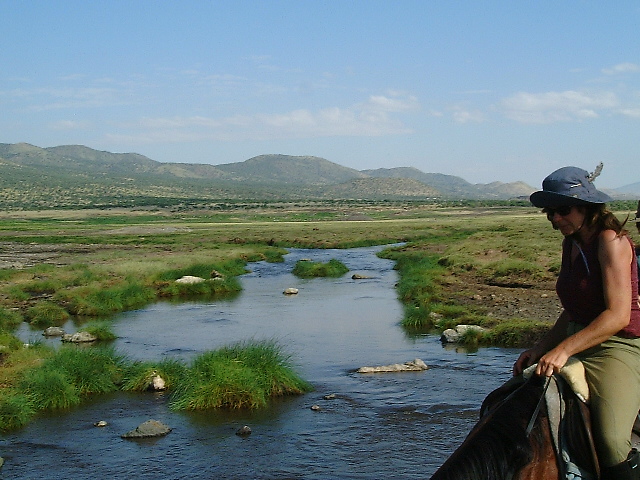
Negotiating a creek of hot water.
Looking south over the salt grasses.
Oh mighty Lengai, help us!!
Riding on a soft mud flat next to the lake.
Surface littered with uncounted bodies of young birds and eggs.
Oh Lord, I had a bad feeling about all this!!
Why I hate riding over boggy ground.
I'll tell you why I had a bad feeling.
Back in 1957, when I was 11, my family moved to a rural part of California,
the Marine Corps Base at Camp Pendelton. I loved exploring this new country
by myself. While wading across the shallow water of a creek, the
muddy bed turned liquid and I immediately sank to my chest in quicksand.
I couldn't move and I couldn't get out no matter how hard I struggled.
There was nobody around for miles to hear my calls for help. Although
quicksand buoys you up better than water, I could have easily drowned if
I would have gotten face down in the stuff. Fortunately my face was
up while I fought down my panic.
Since nobody was going to rescue me, I started
to look around for ideas to rescue myself. Finally I noticed some
tree roots that had been exposed by erosion and I reached out for the closest
one. It wasn't much of a root, but I grabbed and pulled as hard as
I could. I hardly budged, it was like I was in cement (I couldn't
even kick my legs) and the root soon pulled out. This was bad, this
was real bad because the pulling shifted me so that my face was closer
to the surface of the water covered sand. As bad as I had made it
for myself, it gave me an idea. I reached out and got another root,
but this time I pulled with a slow steady force that wasn't enough to pull
the root out. After the longest time I could feel myself moving a
little and I was getting a tiny bit closer to to where the thick roots
were. As soon as I could, I grabbed a big root and started the slow
pull that finally got me out of the quicksand. I never told my parents
what had happened.
As part of the recreation program on Camp Pendelton,
the Marines has a stable of riding horses. Not too long after my
encounter with quicksand I took my first trailride on one of those horses.
I got a lot of good training at that young age and one thing I learned
was how to look for areas that might be quicksand. Even so, from
time to time, I've gotten myself and my horses in bogs and quicksand through
misjudgments and accident. The last really serious incident was about
6 years ago.
During an unusually long wet spell during that
winter's rainy season, both I and my horses were feeling really cooped
up. When we had a little break in the weather, I took the best horse
I've ever owned, Chester, on a long trail ride through a very muddy and
wet countryside. After we had been out some time, I decided that
we had better get back. I didn't want to go back the way we had come
because the bridge we had used to cross a creek was undermined and I was
hoping to find a better way. Well, we proceeded to walk on narrow
strip of high ground between the creek and a thicket of tall bamboo.
I kept looking for a safe place to cross and finally found a ford that
looked like it might be OK. Good old Chester knew better and was
very reluctant to leave the firm ground, but he would do anything for me
so he stepped off into what looked like a firm mud flat and we started
to cross.
We only got about 3 yards when the mud liquefied
and Chester sank up to his butt in quicksand. He began to violently
struggle to get out and I knew that we had to part company immediately.
On his back I was doing nothing but interfering with his frantic attempts
to save himself and I was very likely to end up under him and drown.
I kicked off the stirrups and slid off his back right into the quicksand,
but was careful to land right side up - landing on my face in the stuff
could be fatal. Once off the horse I moved my legs as fast as humanly
possible and in that way avoided sinking my tall boots more than half way
to my knee with each step. In only 4 or 5 giant steps I was on the
bank with the bamboo on one side and my poor horse in the sand on my other
side.
I watched in horror as the poor animal struggled
and I was sure he'd have to give up soon. My only hope by now was
that he'd be able to float with his head up and not drown while I got a
rescue party together with ropes and a winch. To my utter amazement,
the struggling animal turned himself toward me and started making
his way toward the bank as if he was looking to me to save him.
He made it all the way to the bank and pulled
himself out right on top of me. I was absolutely sure I was going
to get trampled, but somehow he avoided stepping on me. No, Chester
didn't trample me, but he tightly pinned me between himself and the bamboo.
Wedged between the horse and the bamboo, I couldn't move an inch up, down
or sideways. Get off of me, damn you, I kept yelling, but Chester
was too scared to move.
Finally the humor of the situation dawned on
me and I couldn't help but laugh at the mess I had gotten us into.
Calming myself down had a salubrious effect on good old Chester and
he finally let me push him away an inch or two so that I could worm my
way to his front. Once there, I was able to lead him back along that
narrow strip of firm ground and find an opening in the bamboo. We
took the long way home and a couple of hours later we both returned to
the stable alive, but very wet and covered in sand.
So you are asking, what is the moral of the
story? The moral of the story is that I really, really hate falling
in quicksand. I know what can happen, so I'm very reluctant to ride
a horse into a boggy area. If we have to pass over ground that looks
suspicious, I want to be very close to some firm ground so that we have
some chance to make it back to safety if the stream or bog turns to quicksand.
Regardless of how I felt about it, we
were heading toward the muddy flats and the shore of the Lake. We
were getting further and further from the firm ground and it was starting
to get mushy. I was getting nervous, real nervous. There was
nothing we could do about it and nobody will ever know how much self control
I had to exert not to say anything. I overheard Stefan asking why
we were going this way and I heard Lisa saying something about needing
the horses to make the trip back home. I didn't have to ask what
she meant because I knew for sure why we were there - we were there because
the horses had lost their shoes and they had not made plans or budgeted
for replacement shoes. If we subjected them to the hard ground of
the trail, they would be crippled and we'd have to walk home.
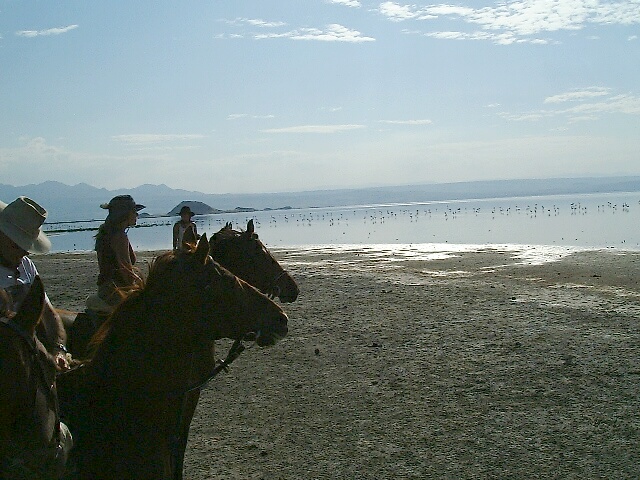
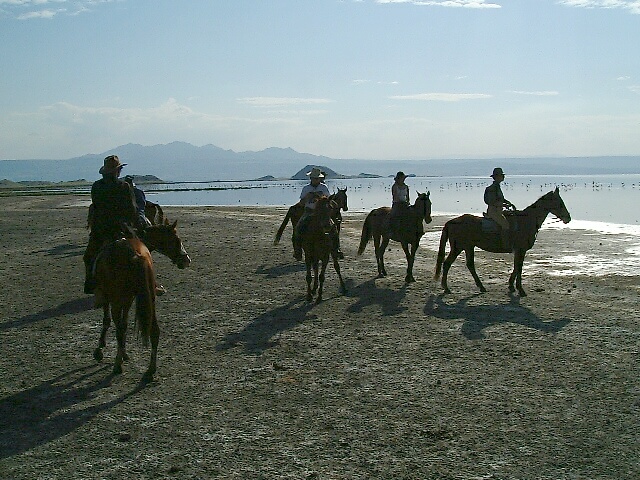
Riding on the mud to the edge of the lake and looking for a way north.
We tried to make some northward
progress on these mud flats, but after a bit, some of lead horses started
going down. Things were looking very grim. We couldn't go forward
so we went back, but found that by now the stream banks were impassable.
Leaving the environs of the Lake was out of the question because the trail
near the base of Mt. Gelai was too hard for the horses' feet (as
mentioned). So we had to go back toward the lake and again the horses
started
sinking in the mud in a very distressing manner. Oh God, what were
we going to do now?!? At that point, Annabelle and Terry waded out
into the lake and discovered that their horses didn't sink as badly out
there. It looked like riding in the lake was the only option open to us.
WHAT?!? In the Lake?!? Yes, in the Lake!

Lisa looking over the situation. This wasn't good.
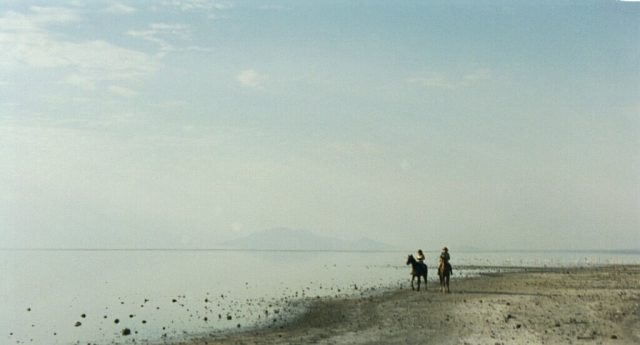
Annabelle and Terry scouting for firm ground.
What choice did we have? None!
We had to go out into the Lake or be lost in that remote wilderness until
they could find us the next day. We would literally have to "take
the plunge" into this hypersaline and hyperalkaline water and we'd just
have to hope to Lengai, or Zeus or Oden or Krishna or Jesus or whatever
god or gods might have been out there that our horses didn't hit a major
soft spot and go down while off shore.
As it was, every time somebody's horse would
sink a foot or two lower than usual and loose its stride, my heart would
be in my mouth. I would think: "Geez-us, the lake bed is going to
liquefy and we're going to go down into that filthy brine and god knows
if we'll drown or be stuck up to our necks in that horrible black ooze
unable to move or get out." There would be no roots to grab
and nobody to rescue us for at least a day or two and our bodies would
be turned into soap by that time. Right in the middle of those thoughts
the struggling horse would right itself and we'd continue our march through
those dark waters.
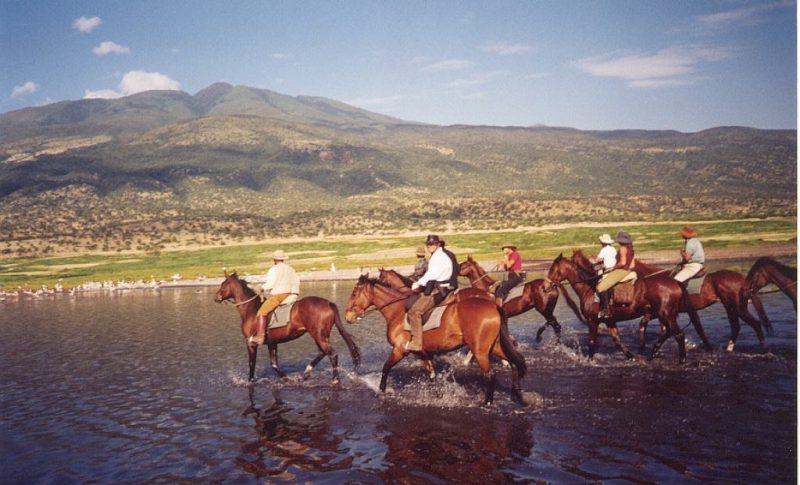
Thanks to Stefan and Bernadette, this is the best picture of the expedition.
More of their pictures
A couple of my pictures taken in the lake.
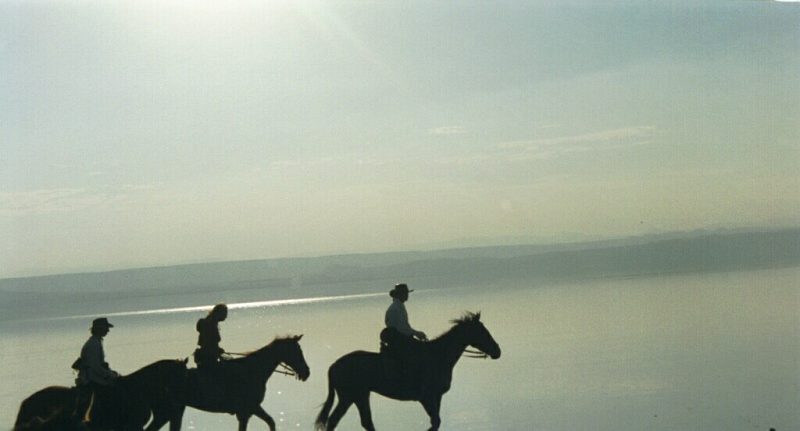
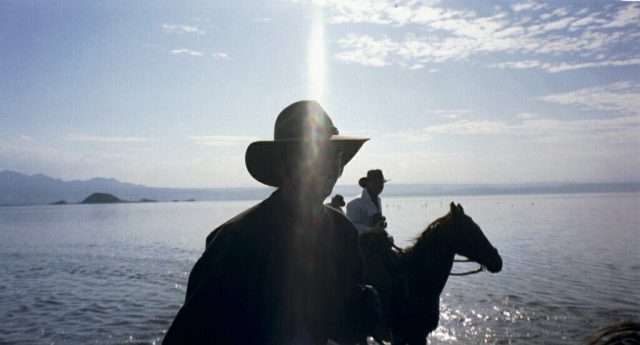
A couple of pictures by Dr. Kolblinger.
The pictures I'm showing you are beautiful
by any standards and perhaps the only pictures of horsemen riding in Lake
Natron dating from any time since the British Army was out there during
WW I. Looking at them now I can't help but be struck by how fortunate
I was to experience something like that - and to be alive to tell about
it.
The truth is, we had absolutely no business
in that lake and I knew it. At the time I was there, my thoughts
were not what a wonderful, unique and beautiful experience I was having,
but how goddamn dumb this whole thing was! Damn, I wanted to know
when in hell were we going to get our butts out of this mess. Looking
back now, I cant help but feel a thrill that, while riding right in the
Lake like we were, we were doing something that (possibly) nobody has ever
done before. Still, in our ignorance of that dangerous environment,
we had absolutely no idea what risks we were taking. My own lifelong
experiences told me that what we were doing was extremely dangerous, but
we had no choice, we had to push on - thanks to a lack of horseshoes.
Do you remember that I mentioned something
about the pictures of us in the Lake looking beautiful? Beautiful
it may look to you, but I'll tell you something folks, it didn't seem all
that beautiful when I was there. Sorry, but I never got around to
taking close-up pictures of the surface of the mud flats. I can't
show you, so I can only verbally describe it as best I can.
Many yards back from the present shore of the
Lake was a horrible sight. Littering the surface were countless flattened
dead bodies of immature flamingos and old unhatched eggs. God knows
I'm no ornithologist, but it looked to me like some weeks previously there
had been countless nests on those mud flats each containing chicks in various
stages of development or eggs that hadn't hatched yet. Heavy rains
must have temporarily raised the level of the Lake and covered the nests
thereby killing all the young and sterilizing all the eggs. When
the waters evaporated and the shore retreated some days or weeks later,
there was left this disgusting pile of drowned bodies and large, very dirty
looking eggs. The eggs were at least twice as large as the largest
hen's egg and contained at least three times the volume. Less than
half of the eggs were open and in those sometimes you could see a tiny
corpse, but mostly the opened eggs were filled with a horrible orange goop.
The eggs were extraordinarily tough and when a horse would step on one,
it would explode with a loud pop and splatter that gross orange goo all
around. Then there was the smell of the Lake. I have smelled
much, much worse in my life (much worse), but this was no nosegay.
I couldn't get it out of my head that this
water and this filthy looking mud we were trekking through was just full
of the worst kinds of germs and getting splattered by it (or God forbid
- being dumped in it) would pollute you for life. Dr. Kolblinger
assured me that the level of pathogenic microorganisms was very low no
matter how it seemed otherwise. Still, it seemed a very noxious place
to me.
The dangers and noxiousness of the lake aside,
I was rather fascinated by the more scientific aspects of my surroundings.
You could see by the way the flanks of the horses would turn white with
crystallized salts when splashed, this Lake was truly "hypersaline."
Lake Natron is as salty or more so than either the famous Dead Sea in Palestine
or the Great Salt Lake in Utah. As a matter of fact, for every 100
pounds (or kilograms) of Lake water, a full 30 pounds (or kilograms) of
that mass is dissolved salts. That is truly an impressive figure
and as concentrated as it is possible to get in nature. In addition
to all the salts in that water, it is also hyperalkaline with a pH of 10
(14 is as high as pH can get). Like, you could use that water instead
of Drano to unclog your sink at home - it would take a little longer, but
it would work. With a good supply of tallow, you could set up a soap
factory. I didn't think of it at the time, but you probably wouldn't
want to get that shit in your eyes either.
As mentioned earlier, Lake Natron has no outlet,
but is kept from filling the valley by loosing water through evaporation
from its surface. Because it is so shallow (only about a yard/meter
deep), its wetted surface varies considerably with fluctuations in the
rainfall during the two rainy seasons. The lake covers between 100
square kilometers at its driest to about 250 square kilometers at its fullest.
On my map, the surface is shown as being 2,000
feet above sea level and that is exactly (to the foot) what my GPS was
showing as we were riding in its waters. At that elevation and at
only 2 1/2 degrees from the equator, it is hot there and the evaporation
rate from the surface of the lake is very high. To keep the lake
maintained in light of this high evaporation rate, the lake is fed by numerous
hot springs and countless seeps that join to form streams that discharge
into the lake from its borders. It is also supposed that there are
hotsprings within the lake's bed that discharge an unknown quantity of
water too. The surface waters we saw flow from the flanks of Mt.
Gelai looked to me like they were flowing at a prodigious rate. At
the time I was thinking that this water must be (what's geologists call)
'Juvenile Water' which means that it is water from deep within the earth
and does not come from rainfall. I have since learned that the water
from the springs is actually ground water that was originally derived from
rain falling in the Rift Valley and discharged here, the lowest point in
the aquifer.
The surface springs can be quite warm and vary
between 90F (32C) and as high as 120F (50C) at their discharge points.
The water from these springs picked up both heat from underlying volcanic
activity and minerals from old evaporite deposits as it migrated through
the aquifer of the Rift Valley. Although not nearly as concentrated
as the lake water itself, the spring water is high in dissolved salts (0.3
to 4.0% of total mass) and can be quite alkaline with a pH of between 9
and 10 (mostly from NaHCO3 - AKA, 'washing soda'). In a bit I'll
describe washing my clothes in water from a hot spring, but for now let
me say that you need very little soap when you bathe in the pools or wash
your clothes. The pH of the stream we camped by was so high, my skin
felt slippery as the top layers were sopanified by the alkalinity.
The oils and other organic matter that makes your cloths dirty and smelly
are likewise turned into soap when you wash them in this water. The
dirtier the clothes, the more soap them make for themselves. If you
would set up a laundry out there, you could save big money on cost of hot
water and soap.
Gee, wasn't all that interesting? No?
OK, back to the story.
With all the time we wasted searching for a
route north and the slow going while traveling in the lake, we made very
poor time. By late afternoon we were still splashing along when finally
we came to a point of land that extended into the lake. It looked
like we would have to exit the lake and I, for one, was very happy to do
so. The poor horses. They were tired, hungry and thirsty and
the ground they now had to walk over was hard and rocky.
Mercifully, we didn't have to go more than
a mile or so before we saw the camp. By the time we saw the camp,
the sun was low over the lake in a most beautiful sunset. I very
much wished I could have stopped so I could have gotten a decent picture,
but my horse felt an urgent need to end his day's journey and would not
stand still or slow down. While bouncing and moving about on the
animal's back, I snapped these pictures with my digital camera. Technically
flawed, I still think they are beautiful, but they, by no means, do justice
to the actual beauty of that scene.
Our first sunset at Lake Natron
As the sun sets over Lake Natron,
it reflects on the placid waters.
This sight alone was almost worth the journey.
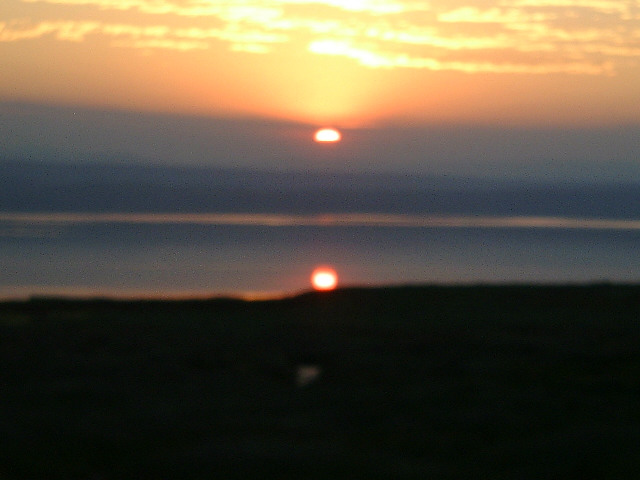
The sun about to be lost in the haze at the horizon.
We trudged the last few yards in the growing
darkness, but we knew that everything was set up for us and that a good
supper would be ready soon. At long last we had arrived in Camp.
Go to Chapter 17
Return to table of contents

